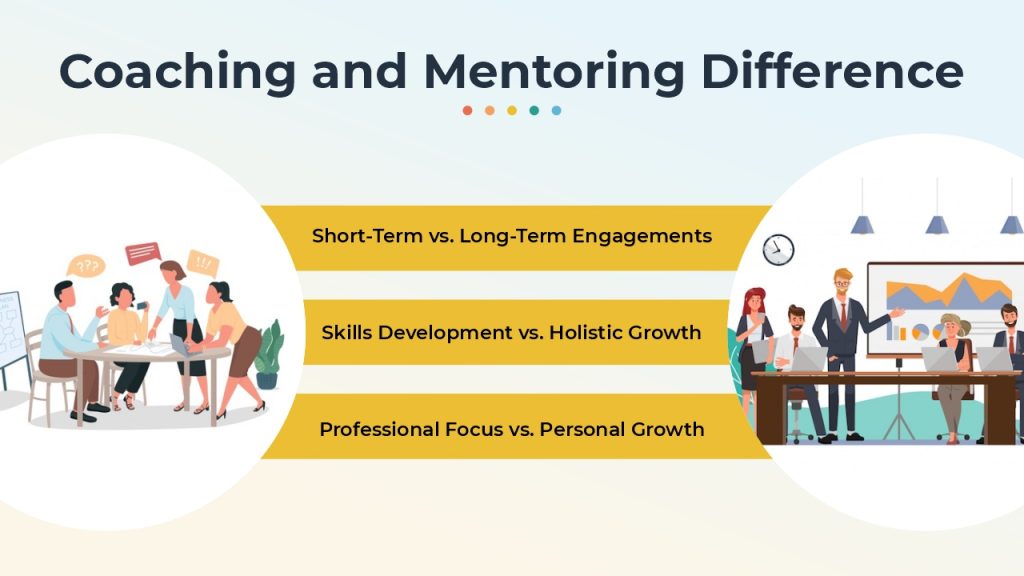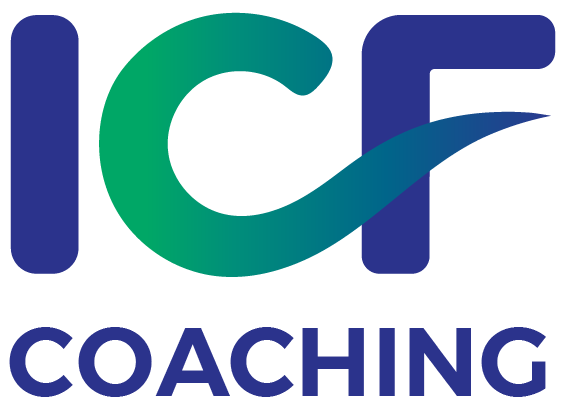Table of Contents
ToggleThe Subtle Symphony of Coaching and Mentoring: Understanding the Differences

In the journey of personal and professional growth, two guiding stars often shine bright—coaching and mentoring. While their paths may sometimes intertwine, they remain distinct in purpose, approach, and impact. Let’s delve into the nuanced differences between these two transformative practices, uncovering their unique melodies.
The Essence of Coaching
What Is Coaching?
Coaching is an artful practice designed to unlock an individual’s potential and enhance their performance. It’s more than just guidance—it’s a strategic partnership aimed at fostering growth, developing skills, and achieving specific objectives. Unlike mentoring, which often relies on the transfer of wisdom from one person to another, coaching is action-oriented and focused on tangible results. This highlights the coaching and mentoring difference, making coaching a critical tool for driving measurable outcomes in professional and personal settings.
At its core, coaching is a structured process. It operates within a defined timeframe, targeting specific challenges or aspirations. Whether it’s enhancing leadership skills, improving public speaking, or achieving fitness goals, coaching provides a clear roadmap. Coaches act as facilitators, helping individuals unearth their own potential, rather than providing ready-made solutions. This distinction underlines the difference between a coach and a mentor. While mentors may share personal experiences to inspire and guide, coaches focus on empowering individuals to discover solutions themselves.
Key Features of Coaching
Goal-Oriented Approach
Coaching thrives on the power of goals. The process begins by identifying clear, measurable objectives tailored to the individual’s needs. These goals could range from improving professional performance to mastering a personal skill. What makes coaching unique is its precision. Each goal is broken down into actionable steps, creating a blueprint for progress.
Coaches work closely with individuals, continuously refining strategies to ensure alignment with their aspirations. Progress is meticulously tracked, using metrics and feedback to gauge success. This structured approach distinguishes coaching from mentoring, emphasising the coaching and mentoring difference. While a mentor may offer long-term guidance, a coach ensures immediate, results-driven action.
Goal setting in coaching is not a one-size-fits-all endeavor. It’s a collaborative process where the individual’s strengths, weaknesses, and circumstances are considered. This personalised focus ensures the goals are realistic and attainable, fostering a sense of accomplishment and motivation.
Focus on Performance Enhancement
At the heart of coaching lies the desire to sharpen specific skills and behaviors. Unlike mentoring, which often spans a wide array of personal and professional development, coaching hones in on targeted areas. For instance, a sports coach works relentlessly to improve an athlete’s technique, while a business coach might refine a leader’s decision-making abilities.
This laser focus on performance enhancement is what sets coaching apart. It’s about identifying areas for improvement and turning them into strengths. Coaches use various tools, such as simulations, role-playing, and constructive feedback, to ensure individuals not only learn but also apply what they’ve learned effectively.
Coaching also emphasises accountability. A coach holds individuals responsible for their progress, pushing them to step out of their comfort zones. This contrasts with mentoring, where the relationship may be less structured and more exploratory. The difference between a coach and a mentor is evident here—while a mentor might encourage self-reflection, a coach drives action and results.
Coaching’s structured, goal-oriented nature and its focus on immediate performance enhancement make it an invaluable tool for growth. Understanding the coaching and mentoring difference allows individuals and organisations to choose the right approach based on their unique needs. Whether it’s the focused expertise of a coach or the holistic guidance of a mentor, both roles play a vital part in personal and professional development.
The Heart of Mentoring
What Is Mentoring?
Mentoring is a nurturing relationship that thrives on the exchange of wisdom, experience, and guidance. It is a deeply personal and transformative journey, designed to help individuals navigate the complexities of their personal and professional lives. While coaching often emphasises structured, short-term goals, mentoring unfolds as a long-term commitment, focusing on holistic growth and development. This beautifully highlights the coaching and mentoring difference, emphasising the depth and breadth of mentoring as a supportive, evolving relationship.
A mentor serves as a guiding light, much like a lighthouse that helps ships steer through uncharted waters. Unlike a coach, who often provides specific, actionable steps, a mentor offers a more philosophical and reflective approach. This difference between a coach and a mentor is fundamental: while a coach sharpens skills and targets performance, a mentor cultivates wisdom and fosters broader perspectives.
Key Features of Mentoring
Long-Term Relationship Building
One of the hallmarks of mentoring is its enduring nature. Unlike coaching, which is often time-bound and task-specific, mentoring relationships evolve over months or even years. This longevity allows for deep connections, creating a safe space where mentees can share their challenges, dreams, and uncertainties without fear of judgment.
Mentoring is not confined to immediate goals. Instead, it takes a panoramic view of an individual’s journey, considering their aspirations, values, and personal growth. The mentor becomes a trusted advisor, someone who doesn’t just guide but also walks alongside the mentee, offering support and encouragement every step of the way.
This long-term engagement distinguishes mentoring in the coaching and mentoring difference. While a coach might focus on improving a presentation for next week, a mentor is more concerned with helping the mentee build confidence and clarity that lasts a lifetime.
Nurturing Wisdom and Guidance
Mentors are reservoirs of experience, offering insights that only time and trials can bestow. They don’t simply provide answers; they inspire mentees to think critically, explore possibilities, and develop their own solutions. This process is akin to planting seeds of wisdom, which, over time, blossom into self-awareness and resilience.
Mentors often share stories from their own journeys, illustrating lessons learned and challenges overcome. These narratives serve as powerful tools, helping mentees relate to and internalise the advice offered. This storytelling approach marks a key difference between a coach and a mentor. Coaches may rely on structured frameworks, while mentors draw from their personal experiences to impart wisdom.
Moreover, mentoring focuses on developing the whole person. It goes beyond professional skills, touching on values, character, and emotional intelligence. A mentor’s guidance can help a mentee navigate not just career crossroads but also life’s many uncertainties, offering clarity and purpose.
Understanding the coaching and mentoring difference enables individuals to choose the path that best aligns with their needs. Mentoring, with its long-term, wisdom-driven approach, is ideal for those seeking holistic growth and deep, meaningful connections. Unlike coaching, which sharpens skills for immediate performance, mentoring shapes perspectives for a lifetime, creating a legacy of growth and understanding. Both roles are invaluable, but the choice between them depends on the journey you wish to embark on.
Coaching and Mentoring Difference
Understanding the coaching and mentoring difference is essential for those navigating their personal or professional development journeys. While both approaches aim to foster growth, they diverge significantly in terms of focus, duration, and outcomes. This distinction is particularly evident in their emphasis on short-term versus long-term engagements, skills development versus holistic growth, and professional focus versus personal aspirations.

Short-Term vs. Long-Term Engagements
One of the most defining contrasts between coaching and mentoring lies in the timeframe. Coaching is typically a short-term endeavor, designed to address specific challenges or goals within a set duration. A coach works with individuals to deliver results efficiently, often tailoring strategies to solve immediate problems or improve targeted skills. Whether it’s preparing for a leadership role or mastering a presentation, coaching is about focused, time-bound outcomes.
On the other hand, mentoring unfolds as a prolonged narrative of growth and exploration. A mentoring relationship may span months or even years, allowing the mentor and mentee to develop a deep, trusting bond. This long-term engagement enables mentors to guide mentees through various phases of their lives, offering enduring support that evolves alongside their journeys. The difference between a coach and a mentor is particularly striking here: a coach works towards quick wins, while a mentor builds a foundation for lifelong learning.
Skills Development vs. Holistic Growth
Coaching zeroes in on refining specific skills or behaviors for immediate impact. A coach’s role is to sharpen the edges, enhance performance, and equip individuals with the tools they need to excel in defined areas. This task-specific focus makes coaching an invaluable resource for professional development, ensuring measurable progress.
Conversely, mentoring goes beyond skills, aiming for a holistic transformation. Mentors nurture their mentees’ character, values, and emotional intelligence. They offer a broader perspective, enabling mentees to grow not just as professionals but as individuals. This broader scope highlights the coaching and mentoring difference, as coaching provides precision, while mentoring fosters depth.
Professional Focus vs. Personal Growth
The difference between a coach and a mentor becomes even clearer when examining their areas of emphasis. Coaching is often tied to performance metrics, such as productivity, leadership, or efficiency. It’s a practical, goal-driven approach tailored to professional success.
In contrast, mentoring delves into the personal realm. It’s about aligning aspirations with values, nurturing long-term goals, and fostering self-awareness. While a coach might help you climb the corporate ladder, a mentor ensures you’re climbing the right one. This symbiotic balance underscores the complementary nature of both approaches in fostering comprehensive growth.
The Difference Between a Coach and a Mentor
Understanding the difference between a coach and a mentor requires an exploration of their distinct roles and approaches. Both play pivotal roles in fostering personal and professional growth, but their methods, goals, and relationships with individuals are fundamentally different. The coaching and mentoring difference lies in their focus—coaching is about structured, goal-oriented change, while mentoring nurtures long-term development through wisdom and experience.

The Role of a Coach
A coach is a facilitator of change, equipped with structured methodologies designed to deliver measurable results. Coaches work with individuals to identify specific objectives, develop actionable plans, and track progress through tools like assessments and feedback loops. This structured approach ensures that coaching remains targeted and efficient, making it ideal for achieving short- to medium-term goals.
In professional settings, a coach might assist an individual in improving leadership skills, enhancing productivity, or navigating a career transition. Their role is not to provide answers but to empower individuals to discover solutions themselves. The focus is on performance enhancement and skill refinement, which distinguishes coaching from mentoring.
Unlike mentoring, coaching often follows a formal, time-bound framework. The relationship is professional, with clearly defined outcomes and timelines. This focus on measurable success emphasises the coaching and mentoring difference, showcasing coaching as a tool for immediate growth and transformation.
The Role of a Mentor
A mentor, in contrast, is more like a trusted advisor—a seasoned guide who offers insights, encouragement, and wisdom from their own experiences. Mentoring is deeply personal, often grounded in a long-term relationship that grows organically over time. Instead of focusing on specific objectives, mentors help mentees navigate broader challenges, offering a perspective that spans both professional and personal growth.
Mentors share their life lessons, helping mentees see the bigger picture. For instance, while a coach might provide strategies to handle a difficult project, a mentor might share stories of similar struggles, offering wisdom that goes beyond immediate solutions. This reflective and narrative-driven approach highlights the difference between a coach and a mentor, with mentoring leaning more toward holistic development than structured goal-setting.
Mentoring relationships are less formal, allowing for a free flow of ideas and experiences. A mentor’s role extends into shaping values, fostering self-awareness, and inspiring confidence. This nurturing guidance underscores the long-term benefits of mentoring, contrasting sharply with the results-oriented nature of coaching.
By understanding the coaching and mentoring difference, individuals can choose the approach that best suits their unique needs—whether it’s the precision of a coach or the profound wisdom of a mentor. Both, in their own ways, are invaluable on the journey of growth and success.
When to Choose Coaching or Mentoring
Deciding between coaching or mentoring depends on individual goals and organisational objectives. Understanding the coaching and mentoring difference can help in selecting the right approach, ensuring it aligns with specific needs and aspirations.
Individual Goals and Needs
The decision between coaching and mentoring often hinges on what an individual seeks to achieve. If you’re looking for immediate performance improvement or want to hone a specific skill, coaching is your best choice. A coach provides a structured, results-oriented process tailored to address particular challenges or objectives. For instance, someone preparing for a leadership role might benefit from coaching to refine communication and decision-making skills.
On the other hand, mentoring is ideal for those seeking long-term guidance in their careers or personal lives. A mentor’s role goes beyond skill development, delving into broader areas like values, aspirations, and overall growth. Mentoring helps individuals explore their potential over time, offering the depth and perspective needed to navigate complex life or career transitions. The difference between a coach and a mentor becomes apparent here—coaching is about short-term performance, while mentoring focuses on enduring growth.
Organisational Objectives
Organisations, too, can benefit by leveraging the coaching and mentoring difference. Coaching is often utilised to achieve quick skill upgrades or address performance gaps. For example, companies may use coaching programs to help employees adapt to new technologies or roles swiftly.
Mentoring, in contrast, is a long-term strategy aimed at cultivating future leaders and fostering a robust organisational culture. By pairing experienced mentors with rising talent, organisations ensure a transfer of knowledge and values that prepares the next generation for leadership.
Both coaching and mentoring are invaluable tools, but understanding their unique strengths allows individuals and organisations to make informed, strategic choices.
How Coaching and Mentoring Work Together
Coaching and mentoring are not mutually exclusive approaches to growth and development; instead, they complement one another beautifully. Understanding the coaching and mentoring difference is crucial to leveraging both effectively, as each brings its unique strengths to the table. Together, they create a dynamic and harmonious journey of personal and professional growth.
Imagine a dancer perfecting their craft. A coach teaches the precise techniques, ensuring every move aligns with perfection. The coach’s role is to refine performance, identify areas of improvement, and provide actionable feedback to elevate skills. Simultaneously, a mentor steps in to inspire the dancer with stories of perseverance, sharing wisdom about the emotional and artistic aspects of the craft. The mentor offers a broader perspective, helping the dancer connect with the art on a deeper, more meaningful level.
This synergy mirrors how coaching and mentoring work together in various spheres. Coaching provides the structure and focus required to achieve immediate, measurable outcomes. Whether it’s mastering a technical skill, preparing for a promotion, or navigating a specific challenge, coaching delivers tangible results. On the other hand, mentoring adds depth by nurturing personal growth, building resilience, and offering a guiding hand through life’s uncertainties.
The difference between a coach and a mentor becomes a strength when combined. While coaching focuses on the “how,” mentoring delves into the “why.” A person receiving both can simultaneously address short-term goals through coaching while embracing long-term transformation through mentoring.
In essence, coaching and mentoring together create a well-rounded growth experience. They ensure that individuals not only achieve their objectives but also grow into well-rounded, thoughtful, and resilient individuals. By integrating both, one can harness the best of both worlds—precision from coaching and wisdom from mentoring.
The Benefits of Both Approaches
Empowerment Through Coaching
Coaching is a transformative process that empowers individuals to take charge of their progress, building confidence and resilience along the way. At its core, coaching is about unlocking potential and providing the tools needed for personal and professional growth. A coach acts as a facilitator, guiding individuals toward self-discovery and encouraging them to overcome obstacles with determination.
What sets coaching apart is its structured approach. Through clearly defined goals, actionable plans, and consistent feedback, coaching instills a sense of ownership and accountability. This empowerment is not just about achieving immediate objectives; it is about fostering a mindset that embraces challenges and seeks continuous improvement. The coaching and mentoring difference becomes evident here, as coaching focuses on equipping individuals with the skills and confidence to thrive in specific contexts, such as leadership roles or performance enhancement.
Coaching isn’t about handing over solutions but about enabling individuals to find their own. It builds resilience by teaching them to navigate setbacks with confidence and to view challenges as opportunities for growth. This empowerment forms the foundation for long-term success, making coaching an invaluable tool for personal and professional advancement.
Enlightenment Through Mentoring
Mentoring, on the other hand, illuminates the path forward by providing wisdom, perspective, and purpose. A mentor serves as a trusted advisor, sharing experiences and insights that help individuals navigate life’s complexities with greater clarity. Unlike coaching, which is often goal-oriented and time-bound, mentoring focuses on broader, long-term growth, emphasising personal values and life lessons.
Mentors help mentees see the bigger picture, offering guidance on how to align their aspirations with their deeper purpose. This enlightenment is transformative, helping individuals gain self-awareness and make decisions with clarity. The difference between a coach and a mentor lies in this depth; mentoring goes beyond immediate results to nurture enduring growth and understanding.
Together, coaching empowers, and mentoring enlightens, creating a powerful synergy for comprehensive development.
FAQs
Conclusion
Understanding the differences between coaching and mentoring enriches both personal and professional journeys. Each offers unique value, tailored to specific needs and aspirations. Whether it’s the structured push of coaching or the nurturing pull of mentoring, these practices illuminate paths to growth, success, and fulfillment.

